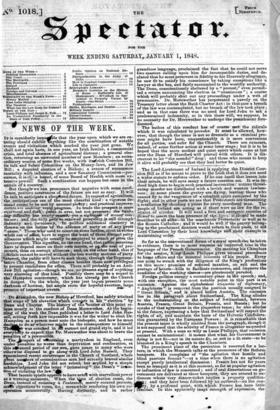Dr.iftlampden, the new Bishop fif Hereford, has safely attained that
stage of his elevation which consists in his " election ' by Dean and Chapter. The history of the 'matter at this point re- lates mostly to the conduct of Dean Merewether. At the begin- ning of the week the Dean published a letter to Lord John Rus- sell, setting forth how impossible it was for the writer to elect Dr. Hampden as a person meet unto the bishopric, and how he must deeto do so-whatever might be the consequences to himself. Th eat was couched in A earnest and grand style, and it led everyb y to expect that 19r. Merewether was about to brave the penalties of a prwrnuniie. The.i.ospect of wiltnessing a martyrdom in England, even under penalties no worse than deprivation and confiscation, at this al,anced period of our sera, gave pause to many who were
• otherwise disposed to go along with Lord John Russell. They i remembered recent occurrences n the Church of Scotland, where great numbers of .conscientious men had actually braved similar hardships. Lord John did not relent, but eplied by a simple acknowledgment of the letter "intimating" the Dean's " inten- tion of violating the law."410
That laconic epistle appears to have actefl with marvellous power as a warning memento. When the tikne of election came, the Dean, instead of resisting a l'outranc, merely entered protests, me objections to votes, Sze.; meanwhile rendering his own CO-' operation ministerially. Having distinctly, and in rather grandiose language, proclaimed the fact that he could not serve two masters calling upon him for incompatible duties, and de- clared that he must persevere in fidelity to his Heavenly allegiance, he saw fit to satisfy his conscience by taking exceptions like a lawyer at the bar, and fairly succumbed to the worldly authority. The Dean, conscientiously sheltered by a "protest," even permit- ted a return announcing the election as " unanimous " ; a course which will probably shut out any proceedings under a writ of prsemunire. Dr. Merewether has perpetrated a parody on the Treasury letter about the Bank Charter Act : in that case a breach of the law was contemplated, but no breach of the law took place ; and as in that case there was no need for Lord John to ask a predetermined indemnity, so in this there will, we suppose, be no necessity for Dr. Merewether to undergo the punishment fore- doomed.
The bathos of this conduct has of course met the ridicule which it was calculated to provoke. It must be allowed, how- ever, that though the issue is not so dramatic as a criminal pro- cess might have been, unquestionably it is more convenient for all parties, and safer for the Church. There are rumours, indeed, of some further action at some later stage; but it is to be hoped that the more modest and quiet spirit which came at last over the Dean of Hereford will prevail with others. It is die- creetest to let "the scandal" drop ; and those who meant to keep it alive will probably see that they had better be quiet.






























 Previous page
Previous page